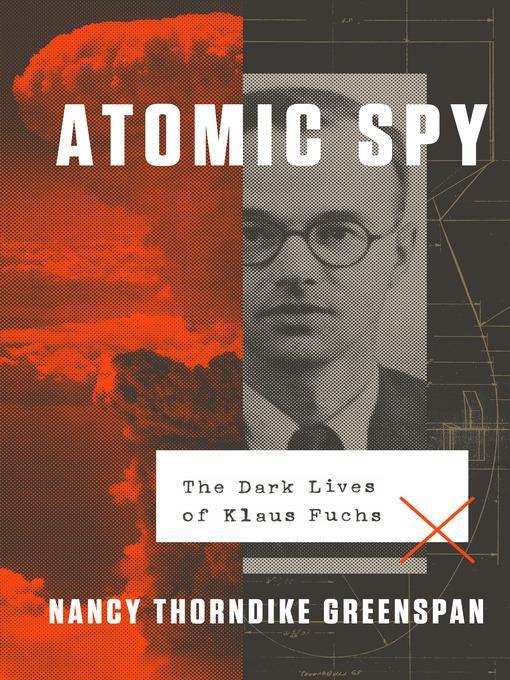
Atomic Spy
The Dark Lives of Klaus Fuchs
کتاب های مرتبط
- اطلاعات
- نقد و بررسی
- دیدگاه کاربران
نقد و بررسی

March 1, 2020
The story of one of the Soviet Union's most dangerous spies. Though the Soviets' bevy of successful spies no longer provokes outrage, their lives retain an irresistible fascination. Readers who have missed a few earlier biographies of Klaus Fuchs (1911-1988) will not regret this latest by historian Greenspan, whose book The End of the Certain World chronicled the life of Fuchs' mentor, Max Born. A young mathematical prodigy, Fuchs entered college in 1930. Always an activist, he switched from the Social Democratic Party to the far more energetic Communists and became a leader in opposing, sometimes violently, the burgeoning Nazi student movement. When Hitler took power in 1933, Fuchs fled to Britain, where he obtained a doctorate in physics, impressing everyone with his brilliance. He joined the British atom bomb research project in 1941 despite a security file that expressed concern over his Communist Party membership. Even at this time, he was passing documents to a Soviet controller. When Britain joined the Manhattan Project in 1943, he was one of the first to arrive in the U.S. Sent to Los Alamos, he won praise and remained after the war, returning to Britain in 1946 to become a leader in its nuclear program. By 1949, information from American codebreakers and Soviet defectors pointed to Fuchs as a spy, and he confessed after a few interviews. Greenspan focuses much attention on her subject's early life, emphasizing his activism over his research and portraying a likable if bland character who regretted only betraying his friends, many of whom remained friends. The Manhattan Project occupies just 30 pages while more than 100 recount Fuchs' surveillance, interrogation, and trial, a section that offers more detail than some readers will want. Ironically, his greatest regret was not spying or spending nearly a decade in prison but losing his citizenship. He wanted to remain in Britain. After his release, he moved to East Germany, resumed his research, and died full of honors. An appealing biography of a productive spy.
COPYRIGHT(2020) Kirkus Reviews, ALL RIGHTS RESERVED.

March 9, 2020
Biographer Greenspan (The End of the Certain World) reconsiders Soviet spy Klaus Fuchs (1911–1988) in this richly detailed work. Born in Germany, Fuchs became a member of the Communist party as a university student in 1932, left the country after the 1933 Reichstag fire, and completed his PhD in theoretical physics in England. Following the outbreak of WWII, Fuchs’s commitment to communism was “reinforced,” Greenspan contends, during his internment at a camp for “enemy aliens” in Canada, where he befriended a Soviet intelligence agent. Released in 1941, Fuchs contributed research to the Manhattan Project and eventually became a division head at Britain’s main nuclear-research facility. At every step of the way, he passed along top-secret information that helped the Soviets build their own atomic bomb faster than expected. Exposed as a spy in the Venona code-breaking project, Fuchs confessed in 1950 and served nine years in prison before immigrating to East Germany. Greenspan portrays Fuchs as a reticent figure motivated by sincere political beliefs and the idea that the free flow of information might prevent a nuclear arms race. Though the book’s prose style is more diligent than dynamic, Greenspan builds tension by interweaving Fuchs’s scientific and espionage pursuits with MI5’s efforts to unmask him. This circumspect account blurs the lines between courage and treachery in thought-provoking ways.

May 1, 2020
With this newest work, Greenspan (The End of the Certain World) tells the complex and captivating story of Klaus Fuchs (1911-88), a German physicist who fled a Nazi manhunt to France and then Britain and, ultimately, came to work in the secret world of nuclear research during World War II and the early Cold War years. The portrait she draws of Fuchs is of a careful man, righteously impulsive in his younger years but passionately dedicated to what he saw as the noble cause of communism against the rise of Nazism. This experience, including time in a British and Canadian internment camp, added to his convictions and undoubtedly influenced his later decision to pass details of British and American wartime nuclear research over to Soviet agents. This continued through to his time at the Los Alamos National Laboratory in New Mexico. From student to scientist to spy, Fuchs is portrayed as a careful and quiet yet passionate man who nevertheless persisted. VERDICT Thoroughly supported by a wide array of archival research, Greenspan's detailed and authoritative yet equally interesting and readable study will appeal to readers of World War II and Cold War history, espionage, and nuclear history.--Philip Shackelford, South Arkansas Community Coll., El Dorado
Copyright 2020 Library Journal, LLC Used with permission.

























دیدگاه کاربران